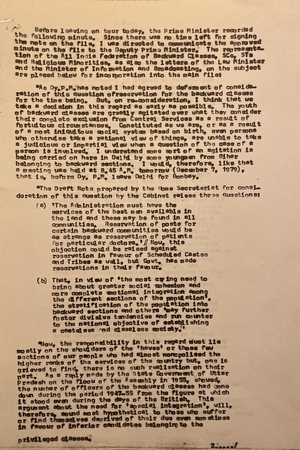The document from December 6, 1979, addresses the issue of reservation for backward classes in central government services in India. Prime Minister Charan Singh reconsidered his earlier decision to defer this matter, opting instead for immediate action due to growing agitation among backward class youth.
Singh proposed a 25% reservation for backward classes (excluding Scheduled Castes and Tribes) in Class I and Class II jobs in Union Government services. This reservation would not apply to higher posts filled by promotion, and children of those who had already benefited from reservation or were income tax assessees would be ineligible. The Prime Minister argued that backward classes, constituting over 50% of the population, had little representation in administration, necessitating this measure to address social inequality.
The note addresses several objections to the reservation policy, including concerns about maintaining the best available talent in administration, potential divisive tendencies, difficulties in defining backward classes for the entire country, and possible conflicts with the Supreme Court's 50% reservation limit. Singh countered these objections, noting that similar reservations had already been implemented by several state governments.
The Prime Minister emphasized the urgency of the matter, calling for an immediate Cabinet meeting the following day (December 7, 1979) to discuss this issue along with an ordinance regarding Aligarh Muslim University. This document provides valuable insight into the political and social considerations behind the implementation of reservation policies for backward classes in India during the late 1970s, highlighting the complex balance between addressing historical inequalities and maintaining administrative efficiency.


